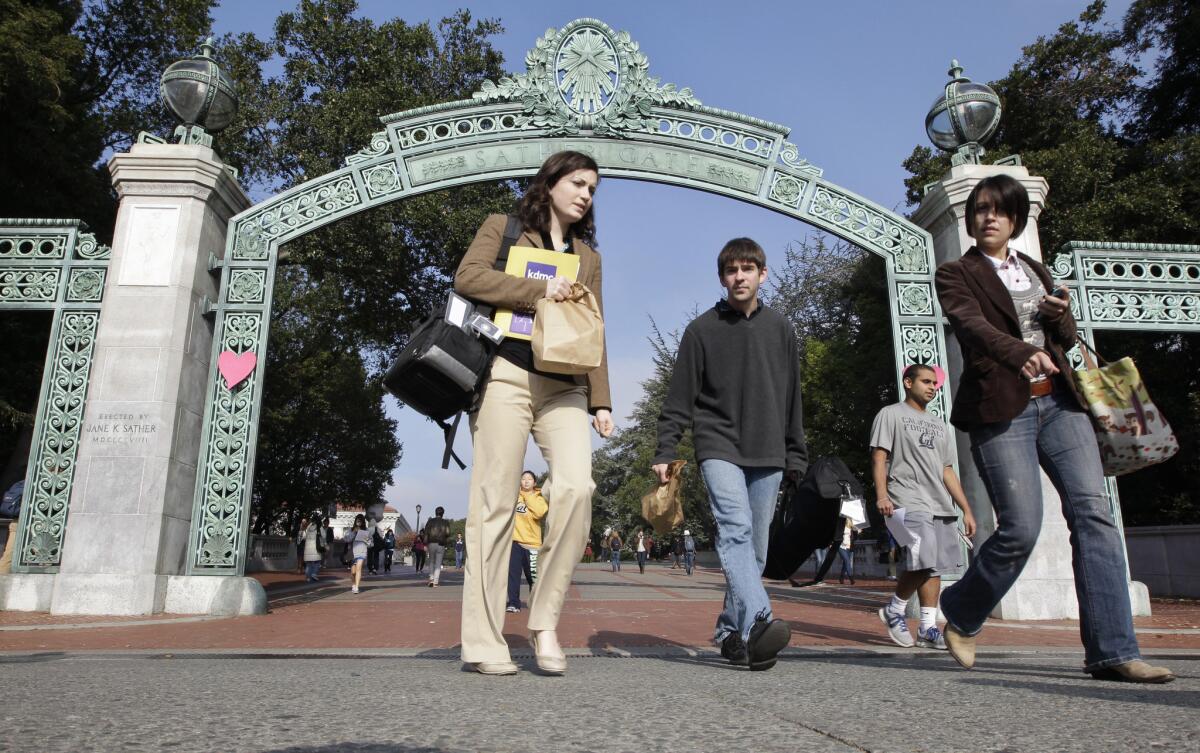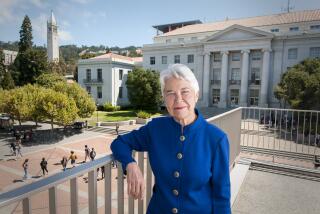Op-Ed: Free Speech and free tuition on campus

- Share via
I’m going back to the Berkeley campus next week for the 50th reunion of the Free Speech Movement. You may have heard in some history class about Mario Savio and the first student sit-in of the ‘60s. That was us FSMers at Berkeley.
It will be a little surreal. A university that had nearly 800 of us arrested in December 1964 is welcoming us back by hanging Free Speech banners on the building we occupied. We’re coming home like a victorious football team! But it’s not a real victory because the same forces that tried to shut us up in the 1960s have a more chilling control over U.S. college students today than they ever had over us. Today, it’s not police control; its economic control.
When I went to Berkeley, it cost me $62.50 a semester. That covered registration, lab fees, healthcare and a student body card. My tuition was free. (It was $600 for out-of-state students.) Today, in-state tuition is $12,872.
There’s been inflation, of course. But nothing that begins to explain this kind of huge jump. The increase also can’t be explained by the cost of new stadiums and lavish buildings, which we intellectual alumni love to deplore. Nor is it due to teachers’ salaries. Low-paid adjuncts do much more of the teaching today than they did when I went to school. Top academic administrative salaries, like top corporate executive salaries, have increased beyond inflation, it’s true, but not by enough to account for a tuition increase from nothing to $12,000.
My tuition could be “free” in the 1960s because higher education was supported by state and federal funds. But since my school days, the rich have rebelled against paying taxes. With so much government support gone, the bulk of tuition must now be paid by students themselves. But student and parental salaries have stagnated at best, so a lot of that increased tuition is financed by borrowing. That gives moneylenders — the very same folks who oppose taxes — a lien on the future earnings of educated Americans.
I realized how much this prospect must dampen the campus atmosphere when I opened the UC Berkeley website and clicked “cost of attendance.” Before I got to the actual dollar amounts, I was assured in big letters that “A Berkeley education earns our graduates an additional $26,333 each year in income over those who did not go to college.”
Since Berkeley is still an excellent school, its students will surely learn to recognize the slippery wording and limited predictive value of that undocumented statistic on future earnings. They will therefore worry about the debt they’re piling up. And they’re right to worry.
Thanks to intense bank lobbying starting in the 1970s, student loans are uniquely punitive. Most can’t be refinanced, which means that people who borrowed at 8% in the 1990s are still paying 8%. Unlike other loans, student loans can’t be discharged in bankruptcy and a borrower’s salary, Social Security and even disability checks can be garnisheed.
Student loans are also exempt from many truth-in-lending laws. I learned what that can mean when I asked a relative in her 40s about her school debt. This is a woman who put herself straight through college and graduate school, not stopping until she had her PhD. But that hasn’t kept her from falling prey to the banks.
When she stayed home for six months with a new child, she accepted her lenders’ offer to lower her $1,200-a-month payment without realizing that the interest that would have been due during this “forbearance” would be added to the principal. So when I asked how it stands now, this bright and darling woman mumbled with embarrassment that after 14 years of making payments she now owes $93,000 on an $80,000 loan. “But don’t worry we’re chipping away at it.”
The pain and shame is much worse, of course, if you ask someone who took on mortgage-sized debts for worthless courses from some for-profit college.
My high school cohort took it for granted that we could make a living. We went to college to discover how to do something “worthwhile” with our lives. Today’s graduates, even from good schools such as Berkeley, don’t have that kind of security.
I’m looking forward to seeing old friends at the reunion. But along with the nostalgia, I suspect we’ll spend a lot of time wondering if there was something we should have done then, or could have been doing more of since then, to make things come out differently. Maybe the indebted generation will figure it out and take our old adversaries by surprise, as we once did.
Barbara Garson wrote the hit play “MacBird!” while at Berkeley. Her latest book is “Down the Up Escalator: How the 99% Live.”
Follow the Opinion section on Twitter @latimesopinion
More to Read
A cure for the common opinion
Get thought-provoking perspectives with our weekly newsletter.
You may occasionally receive promotional content from the Los Angeles Times.






